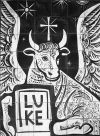
The Gospel of Luke
The Resurrection: Lk 20,27-40
The Sadducees were the Jewish aristocrats, the party of the priests, Acts 5,17. Conservatism was in their natures and we see how Paul played off Sadducees and Pharisees, Acts 23,8.
As conservatives, the Sadduccees did not accept the resurrection. It is a late development in the Old Testament. Only in Dn 12,2-3 in the Hebrew Bible gives clear teaching about the resurrection. In the longer Greek Bible, there it is even clearer in 2 Macc 7,9.
Dt 25,5 provides for a childless widow to marry her husband's brother so that the family line may continue. Here in 20,28-32, the Sadducees are taking in rather to extremes.
Luke omits Mark's comment that the Sadducees do not know their Scriptures.
Instead in verses 34-36, Luke is clearer about the radical newness of the world to come. In this world, marriage and procreation are important. In the world to come, they no longer have their place. All will be sons of God.
Jesus' second answer in verses 37-38 indicates that God continues to be the God of Abraham, Issac and Jacob. They may be long dead but in some sense they are still a living presence with the people.
"For all live unto him" in verse 38 is then added by Luke to make the point.
Verse 40 is taken from Mk 12,34. As we saw in the overview, Luke has moved the next discussion in Mark (Mk 12,28-34) and Matthew to chapter 10 of his Gospel. Here in chapter 20, the result is that all these verses through to verse 44 become a unit,
We can now return to the main page.
Son of David: Lk 20,41-44
That the Messiah would be of the house of David goes back to God's promise to David made through the prophet Nathan (2 Sam 7,12-14). The conundrum of verse 44 reflecting on the psalm highlights the radical newness brought about through the resurrection. The son is indeed Lord.
We now return to the main page.
The Sunday Gospel
The sixteenth century reformers removed the later Greek writings from the Old Testament, and we can say much was lost as a result. However strange 2nd Maccabees may be, it provides us with some important developments in revelation which form a bridge between the Hebrew writings of the Old Testament and the New Testament.
The passage I mentioned in chapter 12 is the only Old Testament reference to the need to pray for the dead. As such it has had great importance in a Church which stressed purgatory.
Chapter 7 of 2nd Maccabees from which this Sunday's reading is taken tells us much about martyrdom as well as about the resurrection. In the unfolding revelation, the two are linked, there is no point in enduring the sufferings of martyrdom if death is the end. While the teaching on resurrection is present in chapter 12 (2 Mac 12,43), chapter 7 makes the point more clearly.
Martyrdom, though not a theme for this Sunday's Gospel, became as we know a prominent feature of Christianity, from the earliest times through to our own day.
I mentioned the 4th book of Maccabees because it speaks of the immortality of the soul. This is a Greek concept which has long been important in Christian teaching. We hear much less about it today because we now prefer not to divide body and soul. We stress instead the creed which speaks of the resurrection of the body.
We can now return to the main page.
